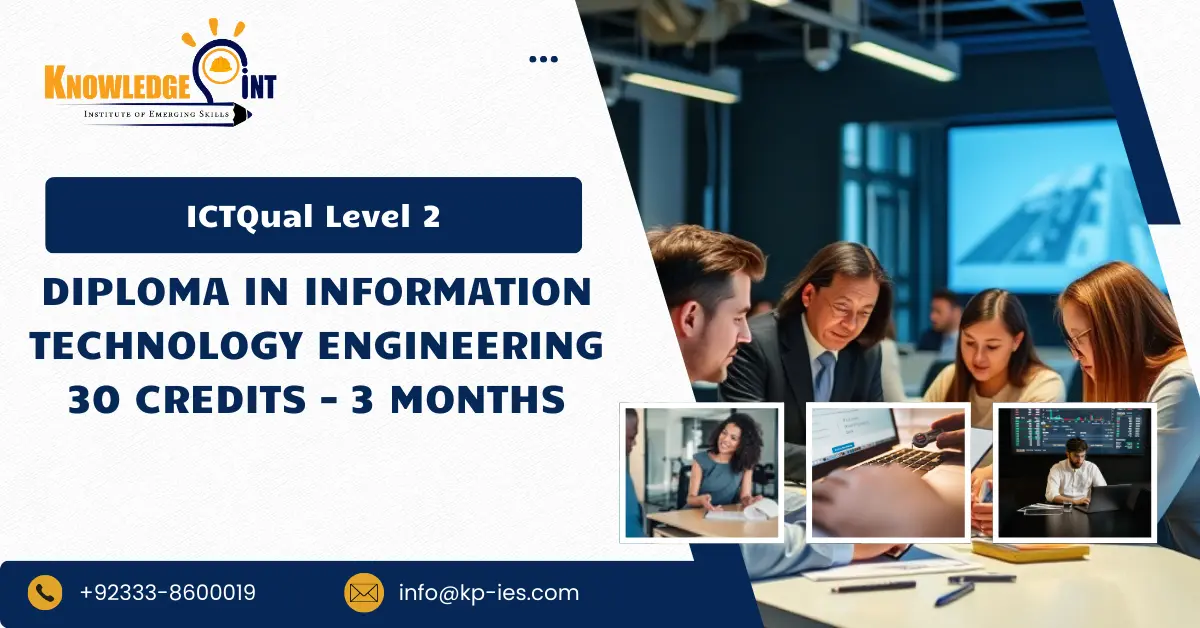The ICTQual Level 2 Diploma in Information Technology Engineering is designed to offer a solid foundation in IT concepts and practical skills, making it an excellent starting point for those looking to enter the IT industry. This short yet intensive program, with 30 credits, is structured to be completed in just 3 months, making it ideal for individuals who want to jumpstart their careers in IT without committing to a lengthy course of study. In this blog post, we will dive into the benefits, structure, and career opportunities provided by the ICTQual Level 2 Diploma in IT Engineering.
The ICTQual Level 2 Diploma is an introductory qualification that covers fundamental concepts in IT engineering. With a focus on essential technical knowledge and practical skills, it prepares students to take on entry-level roles in the IT industry. The diploma is ideal for individuals who are new to the field and wish to build a strong base before pursuing more advanced certifications or specializations in IT.
The ICTQual Level 2 Diploma in Information Technology Engineering is an excellent choice for anyone looking to start a career in IT. It provides a solid foundation in key IT concepts, coupled with practical skills that can be immediately applied in the workplace. With a short duration of just 3 months, this qualification offers a quick and efficient route into the IT field, while also providing a platform for further studies and specialization.
Course Overview
The Level 2 Diploma in Information Technology Engineering 30 Credits 3 Months consists of 3 mandatory units which are as follows.
- Computer Systems and Components
- Networking Fundamentals
- IT Security and Maintenance
The future progression of the ICTQual Level 2 Diploma in Information Technology Engineering 30 Credits – 3 Months can lead learners towards several pathways, depending on their career goals and aspirations in the field of law and related sectors. Here are some potential avenues of progression:
Mandatory Units
- Leadership Qualities and Practice
- Identify Leadership Traits: Recognize key leadership qualities and their impact on organizational effectiveness and performance.
- Leadership Styles and Models: Evaluate different leadership styles and models, understanding how they influence team dynamics and organizational culture.
- Develop Leadership Skills: Enhance personal leadership skills, including communication, decision-making, and conflict resolution, to lead effectively in various organizational contexts.
- Developing Strategic Management and Leadership Potential
- Strategic Planning: Formulate strategic plans that align with organizational goals and adapt to changing business environments.
- Leadership Development: Identify and implement strategies to develop and enhance leadership potential within oneself and across the organization.
- Strategic Decision-Making: Apply advanced decision-making techniques to address complex business challenges and drive organizational success.
- Project Development, Planning, and Management
- Project Lifecycle Management: Understand the stages of project development from initiation to completion, including planning, execution, monitoring, and closure.
- Project Planning Techniques: Use various planning tools and techniques to create detailed project plans, manage resources, and ensure timely delivery.
- Risk Management: Identify potential risks in project management and implement strategies to mitigate and manage these risks effectively.
- Advanced Research Design and Methodologies
- Research Design: Develop comprehensive research designs, including selecting appropriate methodologies, sampling techniques, and data collection methods.
- Data Analysis: Utilize advanced data analysis techniques to interpret research findings and inform strategic decision-making.
- Research Ethics: Understand ethical considerations in conducting research and ensure adherence to ethical standards and practices.
- Personal Leadership Development as a Strategic Manager
- Self-Assessment: Conduct self-assessments to identify personal strengths and areas for improvement in leadership capabilities.
- Development Planning: Create and implement a personal development plan to enhance leadership skills and strategic management capabilities.
- Reflective Practice: Engage in reflective practice to continuously improve leadership effectiveness and adapt to evolving managerial challenges.
- Developing Research Capability
- Research Skills Enhancement: Improve research skills by learning advanced techniques for data collection, analysis, and interpretation.
- Action Research: Apply action research methodologies to address organizational issues and drive improvements based on empirical evidence.
- Research Integration: Integrate research findings into strategic management practices and decision-making processes.
Optional Units (Choose Any TWO)
- Globalisation and Corporate Governance
- Impact of Globalisation: Analyze the effects of globalisation on business operations, strategy, and competitive advantage.
- Corporate Governance Practices: Understand corporate governance principles and their role in ensuring ethical conduct and accountability in global business contexts.
- Global Governance Challenges: Address the challenges of corporate governance in multinational and cross-cultural environments.
- Entrepreneurship and Innovation
- Entrepreneurial Thinking: Develop entrepreneurial skills and mindset to foster innovation and drive business growth.
- Innovation Management: Learn techniques for managing and implementing innovative ideas and solutions within an organization.
- Business Creation: Understand the processes involved in creating and launching new ventures or business models.
- Strategic Human Resource Management
- HR Strategy Alignment: Align human resource strategies with organizational goals and business strategies to enhance performance and productivity.
- Talent Management: Implement effective talent management practices, including recruitment, development, and retention of key personnel.
- Organizational Culture: Understand the role of organizational culture in shaping HR practices and its impact on employee engagement and organizational success.
- Culture and its Impact on Strategy
- Cultural Analysis: Analyze how organizational culture affects strategic decision-making and business performance.
- Cultural Integration: Learn strategies for integrating and managing diverse cultures within an organization to enhance strategic alignment and effectiveness.
- Culture-Driven Strategy: Develop strategies that leverage organizational culture to drive competitive advantage and support strategic goals.
Course Benefits of the ICTQual Level 2 Diploma in Information Technology Engineering 30 Credits – 3 Months :
1. Specialized Expertise
- Auditing Proficiency: Gain specialized knowledge and skills in auditing energy management systems according to the ISO 50001:2018 standard.
- Industry Recognition: Earn a globally recognized qualification that demonstrates your proficiency as an energy management systems auditor.
2. Career Advancement
- Expanded Career Opportunities: Qualify for roles such as Lead Energy Auditor, Energy Management Consultant, or Compliance Officer.
- Higher Earning Potential: Enhance your value to employers and increase your earning potential with specialized expertise in energy management auditing.
3. Industry-Relevant Skills
- Practical Application: Acquire practical skills and techniques for planning, conducting, and documenting energy management system audits.
- Effective Communication: Develop communication skills to interact with auditees, audit teams, and stakeholders effectively.
4. Contribution to Sustainability
- Promotion of Energy Efficiency: Play a key role in promoting energy efficiency and reducing environmental impact within organizations.
- Support for Sustainable Practices: Assist organizations in implementing and maintaining energy management systems that support sustainability goals.
5. Quality Assurance
- Compliance Assurance: Help organizations achieve compliance with ISO 50001:2018 requirements and other relevant regulatory standards.
- Risk Mitigation: Identify areas of non-conformance and provide recommendations for corrective actions to mitigate risks.
6. Continuous Professional Development
- Lifelong Learning: Engage in continuous professional development by staying updated with the latest developments and trends in energy management auditing.
- Networking Opportunities: Connect with industry professionals, auditors, and experts, expanding your professional network and opportunities.
7. Organizational Benefits
- Improved Performance: Contribute to the improvement of organizational energy performance through effective auditing and recommendations for continuous improvement.
- Enhanced Reputation: Help organizations build a positive reputation for their commitment to energy management and sustainability practices.
8. Personal Growth
- Leadership Development: Develop leadership skills to effectively manage audit teams, delegate tasks, and ensure audit objectives are met.
- Confidence Boost: Gain confidence in your abilities as an energy management systems auditor through practical training and hands-on experience.
The ICTQual Level 2 Diploma in Information Technology Engineering provides students with a foundational skill set in IT and offers several significant advantages. Whether you’re looking to enter the IT field or strengthen your current knowledge, here are some of the key benefits of pursuing this qualification:
1. Quick Entry into the IT Workforce
- With a short 3-month duration and 30 credits, the Level 2 Diploma is designed to quickly equip students with essential IT skills. This makes it an ideal choice for those looking to enter the IT workforce swiftly or transition into a career in IT without committing to years of study.
2. Strong IT Foundation
- This course covers fundamental IT concepts such as hardware, software, networking, cybersecurity, and cloud computing. This broad knowledge base prepares students for a variety of entry-level roles in the IT sector, giving them the versatility to work in diverse environments.
3. Hands-On Practical Skills
- The program emphasizes practical, real-world skills, such as troubleshooting hardware and software issues, network configuration, and basic cybersecurity. These hands-on skills are directly applicable to the types of tasks encountered in day-to-day IT roles, making students more job-ready upon completion.
4. Increased Employability
- IT professionals are in high demand across nearly every industry. The Level 2 Diploma significantly enhances employability by providing students with the necessary technical competencies for roles like IT support technician, helpdesk technician, or network administrator.
5. Affordable and Time-Efficient
- The 30-credit, 3-month duration makes the course cost-effective and an efficient use of time compared to longer, more expensive degree programs. Students can quickly gain a recognized qualification without a large financial or time investment.
6. Gateway to Advanced Studies
- After completing the Level 2 Diploma, students can progress to higher-level IT qualifications such as Level 3 Diplomas or industry certifications. These further studies can help students specialize in areas like cybersecurity, networking, or cloud computing, opening up a wide range of advanced career opportunities.
7. Flexible Learning Options
- The course is designed with flexibility in mind, allowing students to choose between full-time or part-time study. This makes it ideal for those balancing other commitments like work or family responsibilities, offering a path to career advancement without disrupting other aspects of life.
8. Industry-Relevant Curriculum
- The curriculum is designed to reflect the latest industry standards and trends. Topics like cloud computing, cybersecurity, and networking ensure students are equipped with the skills employers are seeking. This industry relevance means students will be prepared to tackle current challenges in IT roles.
9. Pathway to Further Certifications
- The qualification lays a strong foundation for pursuing industry certifications such as CompTIA A+, Cisco CCNA, or Microsoft Certified Solutions Associate (MCSA). These certifications add to a student’s credentials and make them more competitive in the IT job market.
10. Opportunities for Self-Employment
- With a solid understanding of IT systems, some graduates choose to explore self-employment opportunities, such as offering IT support services, network configuration, or cybersecurity consulting. This flexibility makes the course attractive for individuals interested in pursuing entrepreneurial endeavors in the IT sector.
11. In-Demand Skills
- The skills developed in this diploma program, including basic networking, cloud computing, and troubleshooting, are in high demand across a wide variety of industries, from healthcare to finance and education to retail. This opens up diverse job opportunities in both technical and customer-facing roles.
12. Professional Development
- The course emphasizes problem-solving, critical thinking, and effective communication—all essential for working in IT environments. These transferable skills enhance overall professional development, equipping students to succeed in team-based environments and to interact with clients and stakeholders.







